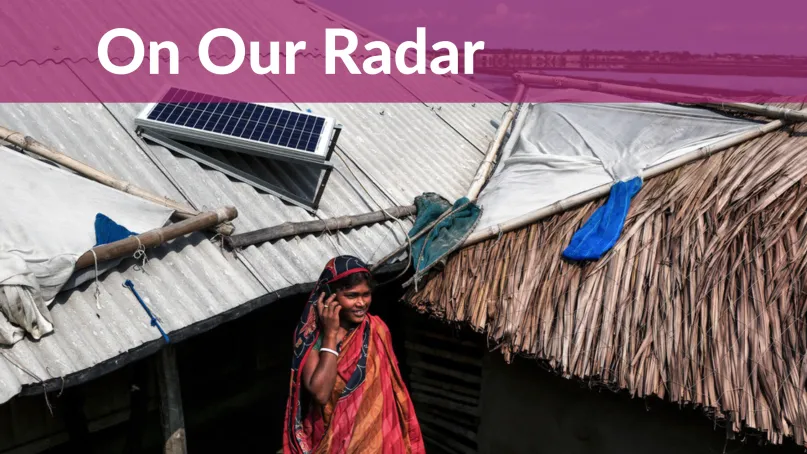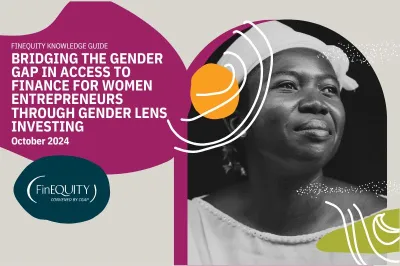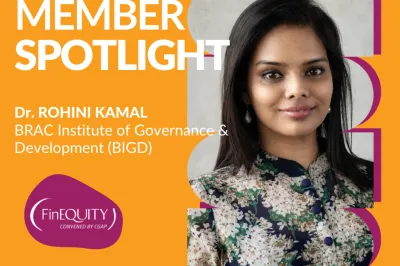On Our Radar: October 2024

An updated take on "What We're Reading". The FinEquity Africa team brings you a curated list of women's financial inclusion and economic empowerment content we've been consuming recently, from podcasts, new initiatives and articles to videos and social posts.
On Our Radar
Data Insights for Financial Inclusion Toolkit
In the digital age, FSPs are increasingly reliant on data to drive their business strategies and customer engagement efforts. However, these providers face challenges in determining the right data to collect to develop advanced business insights that support both organizational growth and the financial journeys of their clients. The Data Insights for Financial Inclusion Toolkit (DIFIT) is designed to empower financial service providers (FSPs) with the data-driven insights to make informed decisions and offer tailored support to their clients. With DIFIT, users can evaluate their current datasets for completeness and relevance, and access interactive tutorials that guide them through the application of data science models and the interpretation of key insights for customer segmentation and customer retention. This solution empowers financial service providers to strengthen their data collection practices, develop targeted strategies, and ultimately drive financial inclusion for their clients.
Young Women and Financial Inclusion: What Works
There are nearly 600 million women aged 15-24 in the world today, with ninety percent living in low- and middle-income countries (LMICs). These young women represent 8 percent of the global population, and in some countries, they constitute an even larger share of the population. This CGAP working paper examines how financial inclusion can help young women overcome barriers and seize opportunities through interventions that support building savings, accessing capital for income generation, and better managing their financial lives. These young women are diverse, making it important to segment them using a life-stages approach. The paper draws on published literature, practitioner interviews, and peer review to identify five key components of financial inclusion strategies that successfully include young women: product design, product delivery, financial capability building, social intermediation, and commercial viability. There is a social and business case for financially including young women, illustrated with real-world examples of how various implementers have applied these success principles. The research includes recommendations for funders, policymakers, and researchers on how to support the growth of financial inclusion for low-income young women.
Delivering on the Promise of Gender Lens Investing (GLI) in Latin America and the Caribbean
This report by IDB Invest delves into the growing ecosystem of Gender Lens Investing (GLI) in Latin America and the Caribbean, showcasing how investors, entrepreneurs, and institutions are increasingly integrating gender considerations into their strategies to drive both financial returns and social impact.
Guidelines: Expanding Financial Inclusion to Women in Mexico
The World Bank Group recently launched guidelines for adopting a gender perspective in financial sector institutions in Mexico. The document aims to guide financial institutions toward the intentional inclusion of women through concrete actions to adapt their product offering and make the necessary organizational and cultural changes. These efforts seek to ensure the long-term sustainability of a gender-focused business strategy. This work represents a fundamental step toward building a more inclusive and equitable financial sector, positioning Mexico at the forefront. As the first exercise of its kind, its relevance may extend beyond national borders, serving as a model for other regions and contributing to the global dialogue on gender-sensitive financial inclusion.
Segmentation of Women-Led Nano and Micro-enterprises: A Guide to Knowledge Resources
As the global financial and development community focuses more on women-led nano and micro-enterprises, considering their impact on local economies, the need for more granular data becomes apparent. CGAP is working to shed light on these questions, the answers of which will help develop targeted strategies to better serve this segment; 1) Who are these women nano and micro-entrepreneurs? 2) What financial and non-financial services do they need to thrive? 3) What resources are already available to them? This guide shares resources from an in-depth literature review focused on women-owned nano and micro-enterprises in India, Kenya, and Uganda.
Beyond Money: Savings Groups as a Platform for Addressing Root Causes of Gender Inequality
While savings groups are widely acknowledged to increase women’s individual agency, there has been less focus on the potential of these groups to act as a platform for addressing the systemic barriers women face in improving their economic situation. The potential of savings groups goes beyond money. Savings groups can be a platform for overcoming the challenges women face in homes, communities and markets which prevent them from improving their economic situation. CARE's learning report explores several ways savings group programs are catapulting women into entrepreneurship and economic resilience by addressing barriers to gender equality, by sharing collective insights and examples drawn from projects across ten countries. The report builds upon the evidence base and learning established in the brief Gender Equality through Savings Groups: Learnings from East & Central Africa, reviewing a range of more recent projects across additional regions to learn from their collective achievements.
WEE CoP Promising Interventions
This document provides an overview of four key interventions aimed at advancing women's economic empowerment in Kenya across various sectors.
- The BuildHer program, established in 2019, focuses on training low-income women for careers in the male-dominated construction industry. It has successfully trained 680 women, 80 percent of whom are now earning dignified wages, and aims to increase women's participation in construction from 3 to 10 percent by 2030.
- The Women-in-Business Incubation Project, a collaboration between the University of Nairobi and TechnoServe, supports 240 women entrepreneurs by providing access to credit, market linkages, and mentorship, resulting in 58 new businesses and significant financial gains for participants.
- The Kidogo Early Years Network empowers informal childcare providers, increasing their income while improving childcare services for over 43,000 children.
- The Unveiling Her Star program, launched in 201 5, equips women with skills for non-traditional sectors like construction, significantly improving their economic independence.
Collectively, these programs emphasize the importance of policy advocacy and practical support in fostering sustainable change for women, transforming both their livelihoods and societal perceptions of women's roles in various industries.


